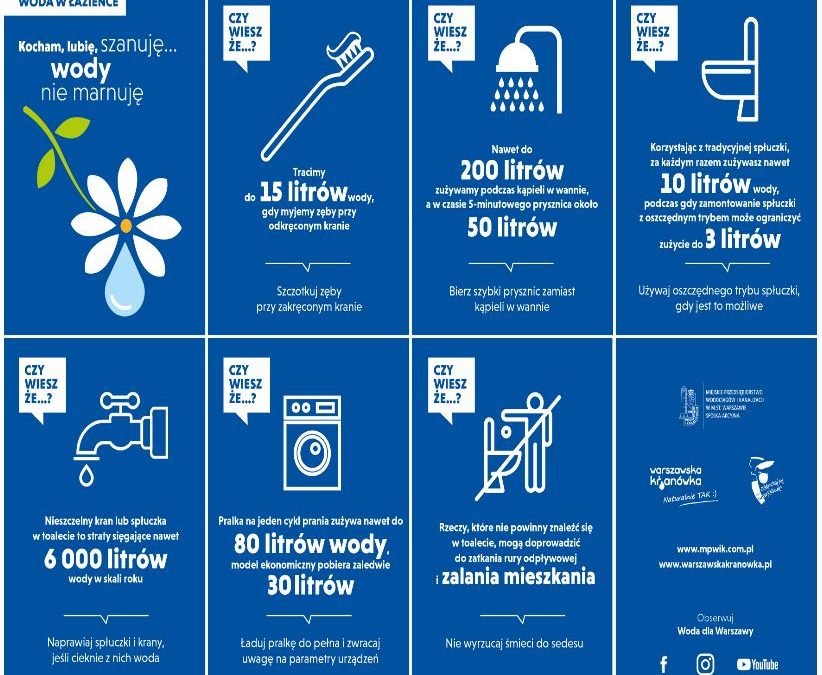Warsaw has launched a campaign to encourage residents to save water during another summer of hot weather that has seen hundreds of municipalities around Poland issue calls for restricted water use.
In its campaign, called “Respect Water”, the city says that its average resident uses around 130 litres of water per day. It has published a series of infographics explaining how to reduce consumption.
Among the tips displayed on the posters are suggestions to turn off the tap when brushing teeth, to choose showers over baths, to use the dishwasher instead of washing dishes by hand, and to water gardens and flowers with collected rainwater or water left over after washing fruit and vegetables.
Każdy mieszkaniec stolicy zużywa średnio około 130 litrów wody dziennie. Warto zatem przyjrzeć się swoim codziennym nawykom. Tym bardziej, że Polsce grozi deficyt wody. W ostatni weekend rozpoczęliśmy kampanię „Szanuj wodę” – zakręcaj, zbieraj, oszczędzaj! 💦 pic.twitter.com/RUK0HTyg5S
— Rafał Trzaskowski (@trzaskowski_) July 20, 2022
“Although Varsovians should not worry – there is no shortage of water in the taps – not all residents of our country are in an equally comfortable situation,” city hall wrote on its website.
Earlier this month, Polish Waters, a state agency, warned that a period of hot, dry weather, which saw temperatures reach around 38°C (100°F) in some places in June, has left over half of Poland at serious risk of drought. Today, temperatures are forecast to reach similar levels again.
According to a map created by the Świat Wody blog, which is run by scientists and experts in various fields related to water resources, this year nearly 300 municipalities in Poland have already issued calls for restricted use of water.
As well as promoting reduced water usage among residents, the authorities in Warsaw have also been taking steps to do so themselves.
As part of the civic budget, a system was built at a municipal office in the Wola district to harvest rainwater, which is used to water surrounding vegetation. In addition, the city has also been using water from swimming pools to clean the streets for the past two years.
“In 2021, 2.4 million litres of water were saved through water recycling,” says the city. It also notes that 27 kilometres of tram tracks have been covered with vegetation, which promotes water retention.
An analogous campaign, also called “Respect Water”, has been launched in the southwestern city of Wrocław. In addition to the tips promoted by Warsaw, Wrocław is also encouraging its residents to reduce food waste and buy fewer clothes, as both the food and clothing industries are water intensive.
Amid another heatwave last year, many districts around Poland also issued appeals for residents to limit water usage. In 2020, as the country faced one of its worst droughts in a century, local authorities took a variety of measures to better recycle and retain water.
Like other parts of the world, Poland has seen rising temperatures in recent times, with 2019 its hottest year since records began in 1781.
Main photo credit: Municipal Water Supply and Sewage Company in the City of Warsaw

Alicja Ptak is deputy editor-in-chief of Notes from Poland and a multimedia journalist. She has written for Clean Energy Wire and The Times, and she hosts her own podcast, The Warsaw Wire, on Poland’s economy and energy sector. She previously worked for Reuters.




















